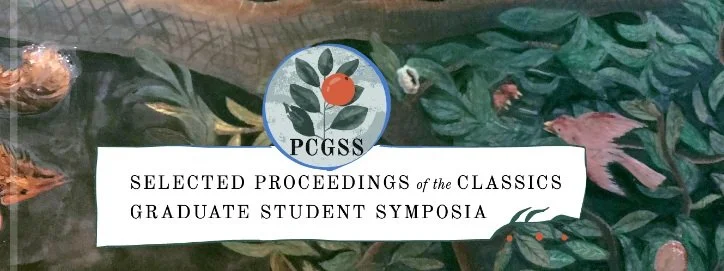Publications & Research Projects
-

What Does Katniss Have to Do with Helen? Tracing the Euripidean Model in Gary Ross’s The Hunger Games (2012)
Abstract
This paper examines in parallel Euripides’s Helen and Gary Ross’s film The Hunger Games (2012). More specifically, it explores the resemblance between Euripides’s and Ross’s storyworlds, focusing on the identity, socio-spatial circumstances, and authorial choices of the female protagonists of the two stories, Helen and Katniss Everdeen respectively. Helen and Katniss exist in their stories as socially othered characters who find themselves confined within carceral-esque spaces which they need to escape in order to return home safe and reclaim or redefine themselves. I argue that to achieve that, they transform the carceral-esque space where they are restricted into an inset stage, a metadramatic heterotopic spatial entity that allows the social Other to contemplate their positionality. In both storyworlds, the inset stage emerges when both female characters conceptualize and perform in front of an internal audience a deceitful plot that features them as actors in roles that seemingly abide by the rules of the carceral-esque space, but, in reality, undermines or challenges the foundations of the space and society itself. Consequently, both works invite their respective audiences to reflect on the socio-political reality of the time and place of their creation, while commenting on the intertemporal condition of the social Other.
-

‘Translating’ Classics for Generations Z and Alpha
Abstract
This paper presents a public outreach program developed by the Department of Classics at the University of Florida to introduce school-age children to Classics. The main goal is to emphasise the value of Classics and the practical skills it teaches by engaging students with hands-on exercises and materialising connections between the past and the present. The paper focuses on the importance of Classics and the humanities in the development of engaged citizens, the types of programs and their content, and ways to ensure the sustainability of such initiatives through the involvement of graduate students, faculty, and administrators.
Co-authored with Dr. Eleni Bozia(University of Florida) and Anthony Smith (University of Florida)
-

Medea Re-Imagined: A Wounded Call to Justice
Abstract
This article discusses the theatrical re-imagining of Euripides’ Medea by Peter McGarry. In McGarry’s play, Medea is punished for her crime and sentenced to suffer the torment and consequences of her murder by repeatedly performing on stage her tragedy throughout time and space. McGarry’s Medea places a spotlight on an enduring facet of human experience, namely, the problem of injustice in its many aspects, comparing Medea’s “just cause” for revenge and killing her children with the wars that modern societies wage in the name of justice, vengeance, or even Gods, which always involve the sacrifice of children and young people to the greater good.
-

Tracing Medea
As a researcher in the field of Classics, I am dedicated to making Greco-Roman culture and history accessible to a broader audience. My aim is not only to cultivate a deeper understanding of how these ancient civilizations have profoundly shaped our modern world, but also to offer contemporary audiences a broader perspective on the enduring human issues that bridge past and present. My work focuses on projects at the intersection of Classics and Digital Humanities, with the goal of illuminating the timeless relevance of Classical antiquity in addressing the fundamental challenges that continue to resonate in our lives today.
Tracing Medea is an example of such a project:
Tracing Medea is an animated archive of performances, places, and identity structures built on the values of visualization and mapping methodologies. Tracing Medea offers a digital spatio-cultural journey of the reception of Euripides’ play Medea, one of the most widely staged ancient Greek tragedies in the modern world.